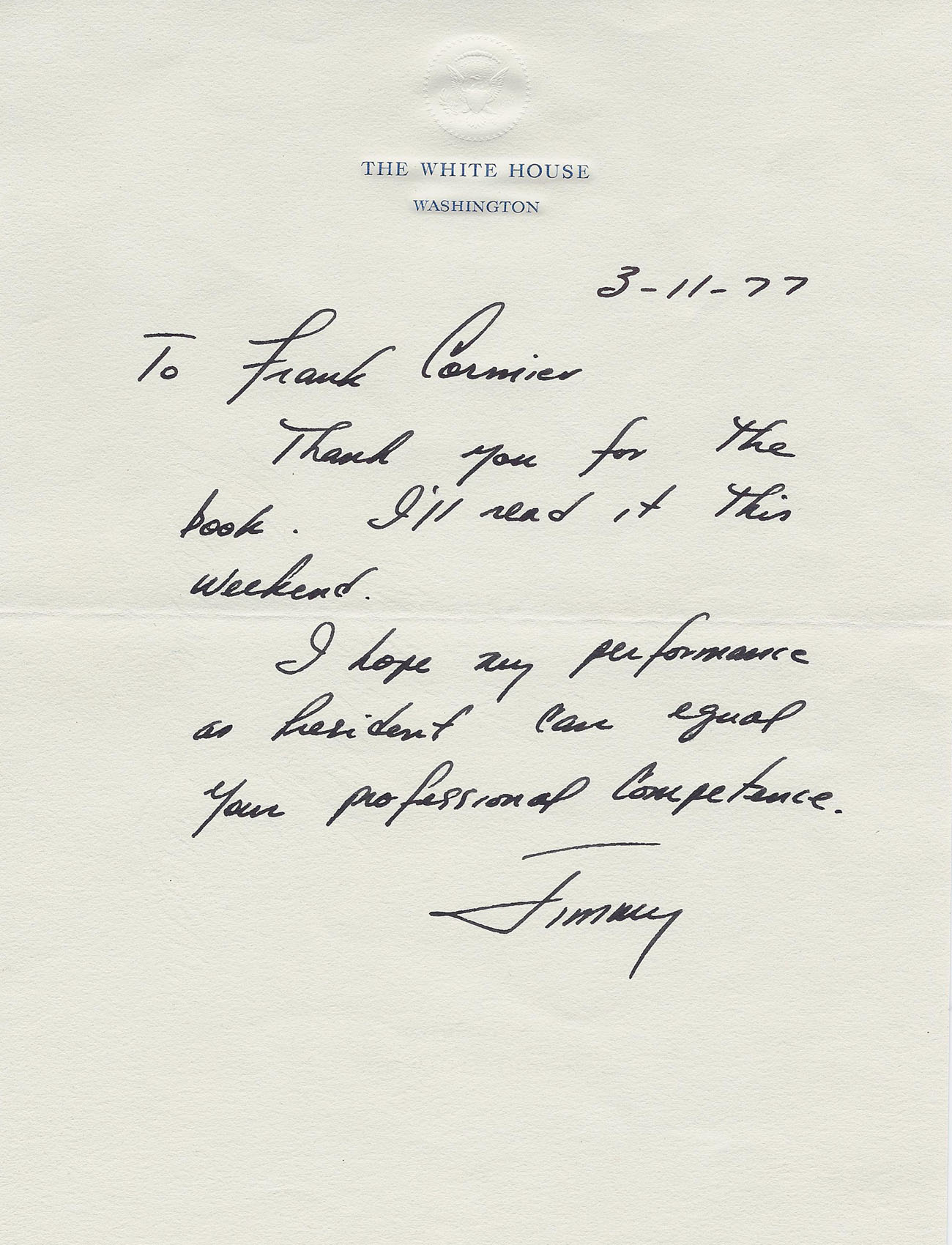A Window Into the Aspirations of Jimmy Carter as He Embarked on His Presidency, Telling the Associated Press White House Correspondent, “I hope my performance as President can equal your professional competence.”



Quite likely the finest ALS of Carter as President to reach the market.
Frank Cormier joined The Associated Press in 1951 and was assigned to Washington three years later. After covering the Treasury, he became White House correspondent in 1962. Holding that post for nearly 20 years, he covered Presidents John F. Kennedy, Lyndon B. Johnson, Richard M. Nixon, Gerald R. Ford, and Jimmy Carter....
Frank Cormier joined The Associated Press in 1951 and was assigned to Washington three years later. After covering the Treasury, he became White House correspondent in 1962. Holding that post for nearly 20 years, he covered Presidents John F. Kennedy, Lyndon B. Johnson, Richard M. Nixon, Gerald R. Ford, and Jimmy Carter. Before illness forced him to retire in 1980, he was the senior wire service correspondent at the White House and therefore designated to close all Presidential news conferences. Countless Americans have heard his voice booming: "Thank you, Mr. President."
In the very early days of the Carter presidency, the new President was formulating and instituting the initiatives he would make as chief executive. One of these, his most important foreign policy alteration, was revealed at the United Nations General Assembly on March 17, 1977. There Carter announced to the world that henceforth the United States would put the promotion and protection of human rights in the forefront of its foreign policy. His U.N. speech was important because it notified both America's allies and the American establishment itself that human rights was henceforth to be a real counter in the game of world affairs. As every signatory of the U.N. Charter was pledged "to observe and to respect basic human rights," said Carter, member nations could no longer "claim that mistreatment of its citizens is solely its own business. Equally, no member can avoid its responsibility to review and to speak when torture or unwarranted deprivation occurs in any part of the world."
As Carter was preparing for the UN address, Cormier presented him with a copy of his new book, "LBJ the Way He Was," a personalized account of the Johnson Administration as Cormier saw it. Carter’s mind was occupied with hopes that his own efforts in office would prove successful, and he admired Cormier. Autograph Letter Signed as President, on White House letterhead, Washington, March 11, 1977, to Cormier. “Thank you for the book. I’ll read it this weekend. I hope my performance as President can equal your professional competence.” This was much more than a tribute to Cormier, although that it was. It was a window into the aspirations of Carter as he embarked on his presidency.
Only six ALSs of Carter as President have surfaced at public sale since he left office in 1981, over three decades ago, nor do we know of any others. These letters generally have no content whatsoever; this is likely the best of them all.

Frame, Display, Preserve
Each frame is custom constructed, using only proper museum archival materials. This includes:The finest frames, tailored to match the document you have chosen. These can period style, antiqued, gilded, wood, etc. Fabric mats, including silk and satin, as well as museum mat board with hand painted bevels. Attachment of the document to the matting to ensure its protection. This "hinging" is done according to archival standards. Protective "glass," or Tru Vue Optium Acrylic glazing, which is shatter resistant, 99% UV protective, and anti-reflective. You benefit from our decades of experience in designing and creating beautiful, compelling, and protective framed historical documents.
Learn more about our Framing Services







































































































